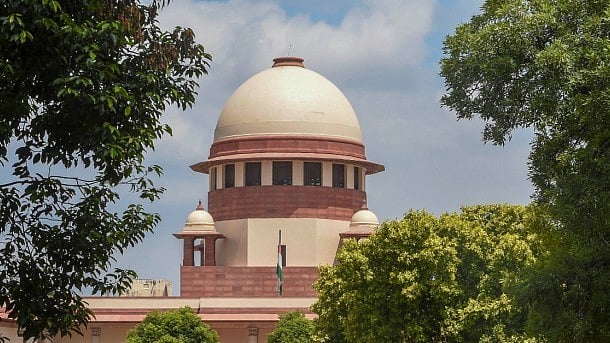
The court also clarified that the interim bail would be subject to the terms and conditions set by the Special NIA court.
Credit: PTI File Photo
New Delhi: The Supreme Court has said when there is an embargo put in by a specific provision under a special enactment in the matter of grant of bail, the power to order release of the accused should necessarily be subject to satisfaction of the conditions mentioned therein.
Setting aside Bombay High Court's order of bail to two accused in a stringent MCOCA case, a bench of Justices C T Ravikumar and Sanjay Karol also said that it was impermissible for courts to appreciate materials on record for the purpose of forming a definite opinion on roles played by the accused in the crime concerned, while considering question of bail.
Senior advocates Mukul Rohatgi and Sidharth Luthra, on behalf of Jayshree Kanabar, wife of the deceased, questioned the validity of the High Court's order of November 6, 2023 granting bail to Rahul Ananda Kamble and Rupesh Ananda Kamble in the case under the MCOCA, following the killing of Rajesh Haridas Kanabar on October 5, 2020 in Pune.
The accused and the 64-year-old property developer were involved in a civil dispute and the victim was shot dead in broad daylight while he came out of the Collector's office after participating in revenue proceedings.
The counsel submitted that without examining whether the twin conditions to be satisfied in terms of Section 21(4) of MCOCA were met, the court transgressed into an impermissible area, took note of the materials on record, and arrived at findings that the respondents had not played any role in the incident of shooting.
Such a highly improper and impermissible manner of consideration that culminated in the order of bail would certainly deprive a fair trial to the prosecution, they said.
The respondents contended that charges under the MCOCA were only inserted later, and they have been enlarged on bail only with adequate and sufficient conditions after remaining in jail following their arrest a day after the incident.
Examining the matter, the bench found the High Court's order did not disclose consideration of specific provisions contained under Section 21(4) of the MCOCA.
The respondents said even in PMLA cases, the Supreme Court held that stringent provisions for the grant of bail would not take away the power of constitutional courts to grant bail on grounds of violation of Part-III (fundamental rights) of the Constitution.
In its judgment on January 2, the bench, however, had noted the bail in the case was granted not on the ground of violation of Part-III of the Constitution but because the High Court had considered the sufficiency or otherwise of the evidence against them available on record.
The court found substance in the contentions of the appellant that the High Court had transgressed into an impermissible area as the question of sufficiency or otherwise and correctness of the prosecution's case were considered, instead of confining the consideration in regard to the question of satisfaction or otherwise of the stringent conditions in the matter of grant of bail where offences under MCOCA are involved.
The materials collected during the investigation, their admissibility and evidentiary value are matters to be decided during the trial and are not matters for consideration at the present stage of the proceedings (bail) the bench said.
The court agreed the High Court's observations partaking the character of findings would cause prejudice to the prosecution during the trial and if they are allowed to remain, it would deprive them of a fair trial.
The court felt those observations ought not to have been made by the High Court regarding the roles played or not played by the accused in the MCOCA case.
The bench also pointed out the High Court's order is "also infected" with absence of consideration which ought to have been bestowed by the court in the matter of grant of bail, taking note of the involvement of allegation of offences under the MCOCA Act.
Besides, the bench said, it is also a matter of concern that in spite of the fact that the accused No 3 was not a party, the High Court made a specific finding to the effect that he played a direct role.
The bench sent the matter back to the High Court for fresh consideration in accordance with law, preferably within one month.
